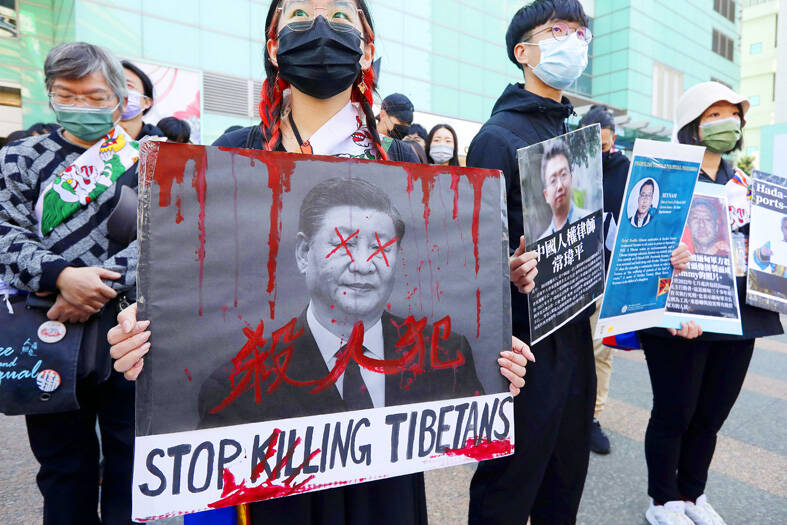A march was held in Taipei yesterday commemorating the 1959 Tibetan uprising against China, showing solidarity with Tibetans and others who protest Chinese oppression.
The rally, held annually in Taipei every March since 2004, was originally intended to commemorate those who died during the Tibetan uprising against Chinese communist rule on March 10, 1959.
The event has grown in size and scope to also support the people of Xinjiang and Hong Kong, organizers said.

Photo: Liao Chen-huei, Taipei Times
Kelsang Gyaltsen Bawa, a representative to Taiwan of the Tibetan government in exile, said before the march that the Chinese People’s Liberation Army invaded Tibet in 1950 and forced Tibetans to agree the following year to what was called the Seventeen-Point Agreement.
However, Beijing soon breached clauses in the agreement that said religion and customs should be respected, and introduced policies aimed at fundamentally changing Tibet’s culture and governance, Kelsang Gyaltsen said.
These changes led to the uprising of Tibetans against the Chinese government in March 1959, he said.

Photo: Chiang Ying-ying, AP
The protesters were violently suppressed by the Chinese government, and the 14th Dalai Lama, Tenzin Gyatso, was forced to flee to India, where he later formed a Tibetan government in exile.
Over the past seven decades, about 200,000 Tibetans have been killed, with tens of thousands forced to leave their homes into exile, Kelsang Gyaltsen said.
Since 2009, a total of 159 Tibetans have self-immolated to protest China’s takeover of their homeland, yet Beijing continues to oppress Tibetans, he added.
He called on Tibetans, Taiwanese and Chinese who face oppression from Beijing to unite to be heard so that one day they can witness true democracy and freedom in China, allowing Tibetans in exile to return home.
Rally participants included Taiwanese democracy activist Lee Ming-che (李明哲), who returned from China to Taiwan last year after serving a five-year sentence for “subverting state power.”
Lee was arrested in 2017 during a visit to Guangdong Province, where he was accused of using online discussion groups to disseminate information and articles attacking the Chinese government.
Lee said that during his incarceration from 2017 to last year, many exiled Tibetans offered support and called on Beijing for his release.
“They [Tibetans] are also suffering, yet they still did not forget to stand in solidarity with me,” Lee said.
The decision to take part in the march to support Tibetans “was only natural,” he added.
Taiwan’s transformation from an authoritarian state to a democracy has been supported by many foreign nationals and countries, Lee said.
Taiwanese should join Tibetans in exile “to let them know that they are not alone in chasing their dream to return home safely,” he said.

Chinese Nationalist Party (KMT) Chairman Eric Chu (朱立倫), spokeswoman Yang Chih-yu (楊智伃) and Legislator Hsieh Lung-chieh (謝龍介) would be summoned by police for questioning for leading an illegal assembly on Thursday evening last week, Minister of the Interior Liu Shyh-fang (劉世芳) said today. The three KMT officials led an assembly outside the Taipei City Prosecutors’ Office, a restricted area where public assembly is not allowed, protesting the questioning of several KMT staff and searches of KMT headquarters and offices in a recall petition forgery case. Chu, Yang and Hsieh are all suspected of contravening the Assembly and Parade Act (集會遊行法) by holding

PRAISE: Japanese visitor Takashi Kubota said the Taiwanese temple architecture images showcased in the AI Art Gallery were the most impressive displays he saw Taiwan does not have an official pavilion at the World Expo in Osaka, Japan, because of its diplomatic predicament, but the government-backed Tech World pavilion is drawing interest with its unique recreations of works by Taiwanese artists. The pavilion features an artificial intelligence (AI)-based art gallery showcasing works of famous Taiwanese artists from the Japanese colonial period using innovative technologies. Among its main simulated displays are Eastern gouache paintings by Chen Chin (陳進), Lin Yu-shan (林玉山) and Kuo Hsueh-hu (郭雪湖), who were the three young Taiwanese painters selected for the East Asian Painting exhibition in 1927. Gouache is a water-based

Taiwan would welcome the return of Honduras as a diplomatic ally if its next president decides to make such a move, Minister of Foreign Affairs Lin Chia-lung (林佳龍) said yesterday. “Of course, we would welcome Honduras if they want to restore diplomatic ties with Taiwan after their elections,” Lin said at a meeting of the legislature’s Foreign Affairs and National Defense Committee, when asked to comment on statements made by two of the three Honduran presidential candidates during the presidential campaign in the Central American country. Taiwan is paying close attention to the region as a whole in the wake of a

OFF-TARGET: More than 30,000 participants were expected to take part in the Games next month, but only 6,550 foreign and 19,400 Taiwanese athletes have registered Taipei city councilors yesterday blasted the organizers of next month’s World Masters Games over sudden timetable and venue changes, which they said have caused thousands of participants to back out of the international sporting event, among other organizational issues. They also cited visa delays and political interference by China as reasons many foreign athletes are requesting refunds for the event, to be held from May 17 to 30. Jointly organized by the Taipei and New Taipei City governments, the games have been rocked by numerous controversies since preparations began in 2020. Taipei City Councilor Lin Yen-feng (林延鳳) said yesterday that new measures by